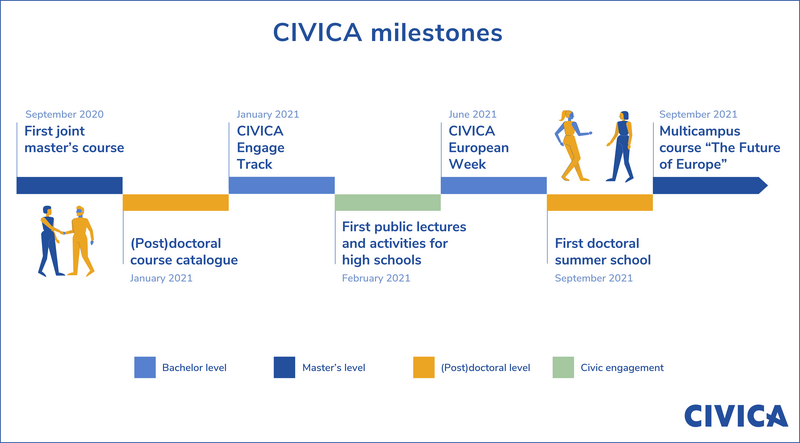CIVICA celebrates two years of positive impact in European higher education
This October, CIVICA – The European University of Social Sciences celebrates two years since the start of activities, following its selection among the pilot European Universities by the European Commission. Since then, the alliance of eight social science universities has taken major steps towards the strategic goals of the current three-year pilot phase and beyond.
Its special focus? Offering students and (post)doctoral researchers across member campuses unique opportunities for Europe-wide learning, research, civic engagement, and collaborative work.
Take a look at CIVICA's milestones in the first two years:

Innovative programmes and courses for students and (post)doctoral researchers
In the fall semester 2020, students could already take advantage of the first CIVICA academic offer: one of several joint master’s courses, a new format co-designed and co-taught by faculty at two different universities in the alliance. Since early 2021, a digital course catalogue has enabled (post)doctoral researchers from any CIVICA campus to access a wide range of training opportunities across the network.
Another development was the launch of the CIVICA Engage Track, a programme that equips undergraduate students with the knowledge and skills to make a social impact in their chosen areas. The first CIVICA European Week, a key component of the Engage Track, took place online in early June. Across four intensive days, undergraduates, high school students and local companies collaborated on a social challenge.
Further cross-campus opportunities became available at the start of the current academic year. At master’s level, students enrolled in the first edition of CIVICA’s flagship multi-campus course "The Future of Europe" work in transnational teams on EU policy issues. At PhD level, the alliance’s first summer school, on European integration, welcomed doctoral researchers in early September to Florence, Italy, to present their research and network in an interdisciplinary format.
In addition to launching specific opportunities, CIVICA members have signed new inter-institutional exchange agreements at an accelerated rate, aiming to facilitate blended or virtual international experiences against the backdrop of the pandemic. This has led to a sharp increase in inter-institutional mobility within the alliance, both at student and staff level.
Innovative programmes and courses for students and (post)doctoral researchers
In the fall semester 2020, students could already take advantage of the first CIVICA academic offer: one of several joint master’s courses, a new format co-designed and co-taught by faculty at two different universities in the alliance. Since early 2021, a digital course catalogue has enabled (post)doctoral researchers from any CIVICA campus to access a wide range of training opportunities across the network.
Another development was the launch of the CIVICA Engage Track, a programme that equips undergraduate students with the knowledge and skills to make a social impact in their chosen areas. The first CIVICA European Week, a key component of the Engage Track, took place online in early June. Across four intensive days, undergraduates, high school students and local companies collaborated on a social challenge.
Further cross-campus opportunities became available at the start of the current academic year. At master’s level, students enrolled in the first edition of CIVICA’s flagship multi-campus course “The Future of Europe” work in transnational teams on EU policy issues. At PhD level, the alliance’s first summer school, on European integration, welcomed doctoral researchers in early September to Florence, Italy, to present their research and network in an interdisciplinary format.
In addition to launching specific opportunities, CIVICA members have signed new inter-institutional exchange agreements at an accelerated rate, aiming to facilitate blended or virtual international experiences against the backdrop of the pandemic. This has led to a sharp increase in inter-institutional mobility within the alliance, both at student and staff level.
Taking stock and looking ahead
Recent achievements are outlined in a progress report submitted by the alliance earlier this year at its 18-month milestone to the European Commission. The report highlights the ways in which CIVICA spearheads a new level of collaboration in European higher education. Notable successes include a boost in mobility opportunities (virtual, blended and physical) for students, (post)doctoral researchers and staff; an efficient and reliable governance structure; and a growing portfolio of innovative programmes for the benefit of academic communities and the broader public.
"The overall coherence of CIVICA and our aspirations for European education and research have been confirmed over the first two years," says Aurélien Krejbich from Sciences Po, the alliance’s Executive Director. He notes that CIVICA is well on its way to establish a physically and digitally connected European campus. Reflecting on the behind-the-scenes efforts, he adds: "We wouldn’t have reached these promising results without clear and full commitment to our joint mission from our partners, a very efficient coordination, and the capacity to thrive on synergies and on the expertise of our members."
The alliance is drawing on a valuable pool of know-how and best practices as it grows its offers: currently, a 400-strong workforce of academic and administrative staff from a variety of departments at the eight campuses is collaborating on CIVICA activities. The teams are drawing on existing practices but also moving beyond them, to create a space for innovation and transnational experiences. “In this regard, the activities we launched in the academic year 2020/21 are truly and concretely cross-campus,” says Krejbich.
And this is just the beginning. Speaking about the first successes, Kate Vivian, Acting Vice President for International Affairs at Sciences Po and alliance coordinator, notes that the design and implementation of CIVICA is a long-term journey.
"We will continue to build on the joint programmes, partnerships and substantive projects created so far. Our vision remains to provide a model of the university of tomorrow, as an open space that connects knowledge and society across European borders." Referring to the European Commission’s announced plans to roll out the European Universities under the Erasmus programme 2021-2027, she concludes: "All in all, we have an exciting upcoming year and a promising future ahead of us."

